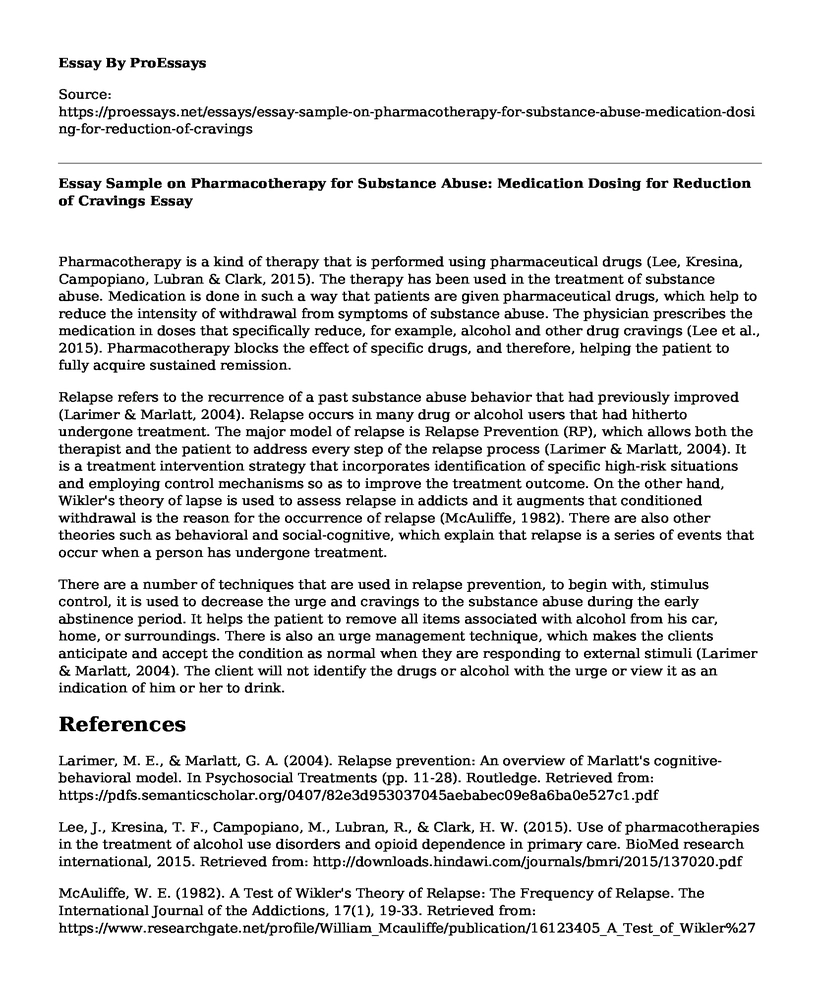Pharmacotherapy is a kind of therapy that is performed using pharmaceutical drugs (Lee, Kresina, Campopiano, Lubran & Clark, 2015). The therapy has been used in the treatment of substance abuse. Medication is done in such a way that patients are given pharmaceutical drugs, which help to reduce the intensity of withdrawal from symptoms of substance abuse. The physician prescribes the medication in doses that specifically reduce, for example, alcohol and other drug cravings (Lee et al., 2015). Pharmacotherapy blocks the effect of specific drugs, and therefore, helping the patient to fully acquire sustained remission.
Relapse refers to the recurrence of a past substance abuse behavior that had previously improved (Larimer & Marlatt, 2004). Relapse occurs in many drug or alcohol users that had hitherto undergone treatment. The major model of relapse is Relapse Prevention (RP), which allows both the therapist and the patient to address every step of the relapse process (Larimer & Marlatt, 2004). It is a treatment intervention strategy that incorporates identification of specific high-risk situations and employing control mechanisms so as to improve the treatment outcome. On the other hand, Wikler's theory of lapse is used to assess relapse in addicts and it augments that conditioned withdrawal is the reason for the occurrence of relapse (McAuliffe, 1982). There are also other theories such as behavioral and social-cognitive, which explain that relapse is a series of events that occur when a person has undergone treatment.
There are a number of techniques that are used in relapse prevention, to begin with, stimulus control, it is used to decrease the urge and cravings to the substance abuse during the early abstinence period. It helps the patient to remove all items associated with alcohol from his car, home, or surroundings. There is also an urge management technique, which makes the clients anticipate and accept the condition as normal when they are responding to external stimuli (Larimer & Marlatt, 2004). The client will not identify the drugs or alcohol with the urge or view it as an indication of him or her to drink.
References
Larimer, M. E., & Marlatt, G. A. (2004). Relapse prevention: An overview of Marlatt's cognitive-behavioral model. In Psychosocial Treatments (pp. 11-28). Routledge. Retrieved from: https://pdfs.semanticscholar.org/0407/82e3d953037045aebabec09e8a6ba0e527c1.pdf
Lee, J., Kresina, T. F., Campopiano, M., Lubran, R., & Clark, H. W. (2015). Use of pharmacotherapies in the treatment of alcohol use disorders and opioid dependence in primary care. BioMed research international, 2015. Retrieved from: http://downloads.hindawi.com/journals/bmri/2015/137020.pdf
McAuliffe, W. E. (1982). A Test of Wikler's Theory of Relapse: The Frequency of Relapse. The International Journal of the Addictions, 17(1), 19-33. Retrieved from: https://www.researchgate.net/profile/William_Mcauliffe/publication/16123405_A_Test_of_Wikler%27s_Theory_of_Relapse_The_Frequency_of_Relapse_Due_to_Conditioned_Withdrawal_Sickness/links/0046352f91976be53c000000/A-Test-of-Wiklers-Theory-of-Relapse-The-Frequency-of-Relapse-Due-to-Conditioned-Withdrawal-Sickness.pdf
Cite this page
Essay Sample on Pharmacotherapy for Substance Abuse: Medication Dosing for Reduction of Cravings. (2023, Mar 07). Retrieved from https://proessays.net/essays/essay-sample-on-pharmacotherapy-for-substance-abuse-medication-dosing-for-reduction-of-cravings
If you are the original author of this essay and no longer wish to have it published on the ProEssays website, please click below to request its removal:
- Critical Thinking on Alarm Monitoring and Alarm Fatigue Among Nursing Staff
- Capstone Evaluation on Pressure Ulcers
- Patient Tracer Discussion for Nightingale Community Hospital
- Paper Example on Cystic Fibrosis
- Essay Sample on Injury and Death Investigations
- Research Paper on PCOS: Complex Pathophysiology and Diagnosis
- 5 Types of Workplace Sexual Assault: Implications and Prevention - Essay Sample







